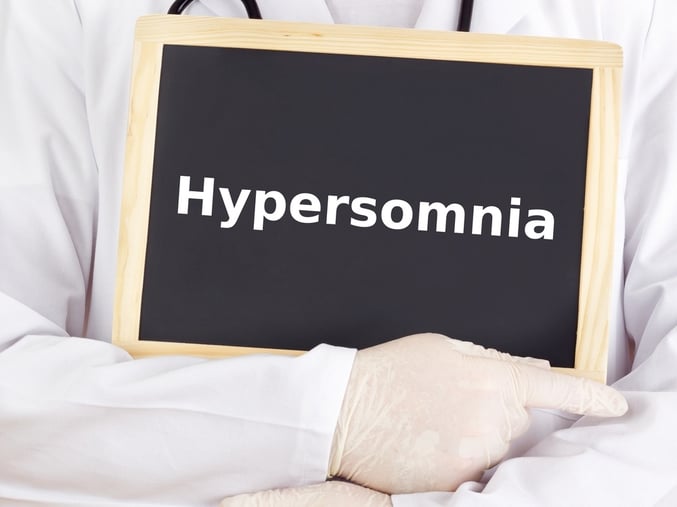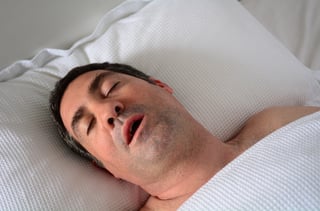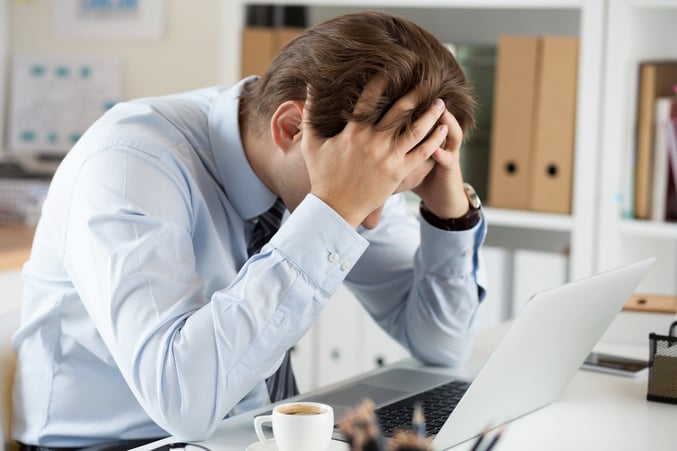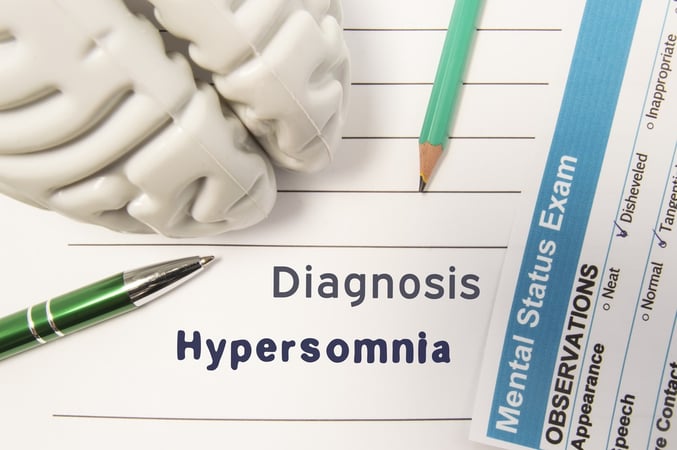
You might be wondering how much sleep you actually require. The amount of sleeping hours needed depends on the individual. Some individuals may require a minimum of nine hours to feel refreshed the next day, while others may only require seven hours.
However, when you’re sleeping 10 hour or more during the night and you’re also taking naps during the day but still feel sleepy, you may be suffering with a condition known as hypersomnia, or excessive sleepiness.
Up to six percent of the population struggles with hypersomonia that impacts their daily lives, according to the National Institutes of Health. There may be various reasons why you would be diagnosed with this condition.
So, what is hypersomnia? Basically, hypersomnia, which is also referred to as hypersomnolence, is characterized by excessive sleepiness the following day despite getting adequate, or even too much, sleep the night before. You may suffer with recurrent or constant extreme sleepiness episodes.
 There are a variety of causes that can lead to extreme sleepiness including obstructive sleep apnea (OSA), narcolepsy, certain medications and sleep movement disorders, and we’ll discuss these in more detail below. But, if you’re experiencing extreme sleepiness and are getting more than an adequate amount of sleep, your doctor may diagnose you with hypersomnolence.
There are a variety of causes that can lead to extreme sleepiness including obstructive sleep apnea (OSA), narcolepsy, certain medications and sleep movement disorders, and we’ll discuss these in more detail below. But, if you’re experiencing extreme sleepiness and are getting more than an adequate amount of sleep, your doctor may diagnose you with hypersomnolence.
When you are struggling with hypersomnia, you’re not only sleeping for long periods of time, but may also have problems with getting up or may enter your REM sleep stage fairly early after going to bed. People who don't have this condition usually take several hours before they enter the REM sleep stage.
You can ask yourself certain questions to see if you may possibly be suffering with hypersomnia. These questions may include:
1. Are you sleeping 10 hours or more each night?
2. Are you finding it hard to wake up each morning?
3. Do you still feel unrefreshed despite getting a full night's sleep?
4. Are certain stimulant medications like Dexedrine or Adderall not working properly to keep you alert?
5. Are you sleepy during the day or fallen asleep inadvertently?
6. Do other family members struggle with extreme sleepiness during the day or hypersomnia?
After asking yourself these questions, if you answered “Yes” to more than a few of them, it might be a good idea to have a sleep specialist evaluate you. Hypersomnia can keep you from functioning properly during the day, can keep you from enjoying your normal activities, can make work responsibilities more challenging, and can interfere with your relationships.
What are the Causes of Hypersomnia?
There are a number of hypersomnia causes, including:
-
Obesity or being overweight
-
Sleep disorders like sleep apnea (pausing between breaths or breathing interruptions during sleep) or narcolepsy (sleepiness during the daytime)
-
Alcohol or drug abuse
-
Prescription medications like antihistamines or tranquilizers
-
A neurological disease like Parkinson's disease or multiple sclerosis
-
Head trauma or injury
-
Depression
-
Genetics (another family member has hypersomnia)
-
Physical problems like tumors
-
Other Medical conditions (epilepsy or encephalitis)
Genetics can play a big role in whether you get hypersomnia or not as well as other factors, like fibromyalgia or brain damage. There are a handful of other conditions that can result in hypersomnia, however, sleep apnea is the most common cause and affects around four percent of the population.
Your doctor may conduct a number of tests to give you an official diagnosis and determine if your hypersomnia is primary (beginning in your brain) or secondary (beginning due to another condition), or possibly idiopathic, meaning it has no apparent conclusive cause.
Primary Hypersomnia
This form of hypersomnia is not as likely as secondary hypersomnia and typically affects less than one percent of the population. It may also include diagnoses like recurrent hypersomnia (Klein-Levin syndrome), idiopathic hypersomnia or narcolepsy.
Secondary Hypersomnia
There is a higher prevalence of secondary hypersomnia and is common in people who have sleep deprivation, upper airway resistance syndrome, substance abuse or restless leg syndrome. Often people who are diagnosed with this type of hypersomnia are genetically predisposed to it.
Idiopathic Hypersomnia
In some instances, there is no attributable cause for hypersomnolence which would classify you as having “idiopathic hypersomnia”.
What are Hypersomnia Symptoms?

The primary symptom of hypersomnia is extreme sleepiness during the day despite getting adequate or extraordinary amounts of sleep.
Other complaints typically include:
-
non-restorative or unrefreshing sleep
-
sleep drunkenness
-
sleep inertia (or feeling groggy or disoriented after waking up from a deep sleep)
With this excessive sleepiness condition, you may find it difficult to operate a vehicle, keep up  with work responsibilities or live independently. Furthermore, just waking up in the morning can be a challenge even with the help of stimulants or family members. Usually, symptoms of this condition appear in early adulthood; however, you may not get a formal diagnosis for many years.
with work responsibilities or live independently. Furthermore, just waking up in the morning can be a challenge even with the help of stimulants or family members. Usually, symptoms of this condition appear in early adulthood; however, you may not get a formal diagnosis for many years.
Although daytime naps are generally short and refreshing with narcolepsy, with hypersomnia, they are long and unrefreshing.
Other symptoms of hypersomnia may include:
-
Increased irritability
-
Anxiety
-
Loss of appetite
-
Restlessness
-
Decrease in energy
-
Slow speech
-
Slow thinking
-
Memory difficulty
-
Hallucinations
When you have hypersomnia, falling asleep comes very easy to you and can happen in any condition and any time. For instance, you can easily fall asleep while you are at work or driving a car. Many individuals have difficulty functioning in occupational, family, social or other settings.
If you have been getting excessive amounts of sleep each night but still feel very drowsy the following day or are experiencing a few or more of the symptoms above, consult with your doctor about getting a possible diagnosis of hypersomnia.
To make a hypersomnia diagnosis, your doctor will typically ask about the amount of sleep you are getting each night, whether or not you wake during the night, what your sleeping habits are like and if you tend to fall asleep in the daytime. He may also ask you if you are taking any type of medications or have any emotional problems that are disrupting your normal sleep patterns.
In addition to asking these questions, your doctor will likely order a number of tests like computed tomography (CT) scans, blood work and a polysomnography sleep test. He may want to measure your brain's electrical activity through an electroencephalogram (EEG) test.
Prognosis and Treatment for Hypersomnia

Your prognosis will ultimately depend on what is causing the condition. If you were diagnosed with idiopathic hypersomnia, this may eventually go away on its own after a few years. However, this is not a guarantee since the cause of idiopathic hypersomnia isn't known.
If you were diagnosed with head injury-related hypersomnia or if another condition led to your hypersomnolence, clearing up on its own may not be a possibility and your hypersomnia will continue on until it’s properly treated.
Your treatment for this condition will depend on whether it's primary or secondary and what the underlying cause is. In some cases, just catching up on your sleep can help with the problem; however, usually it is better if the underlying cause is treated rather than the hypersomnia itself since this condition is really just a symptom in itself.
Some of the more common types of treatments may include amphetamines or other stimulant medications to help you stay awake in the daytime, sleep hygiene and behavioral therapy. Again, it's best that the underlying cause is treated instead and you would need a diagnosis first of what this underlying cause is in order to be treated for it.
Hypersomnia is not a life-threatening condition in itself, however, if you are falling asleep at inappropriate times like while driving a car, it can be dangerous, and even fatal. Furthermore, the excessive daytime sleepiness you’re likely experiencing with this condition can reduce your quality of life. That’s why it is essential to get a diagnosis and treatment for hypersomnia.
If you are interested in learning more about the role of hypersomnia and sleep disorders click the image below to register for the Missouri Sleep 2017 Sleep Medicine Conference.
